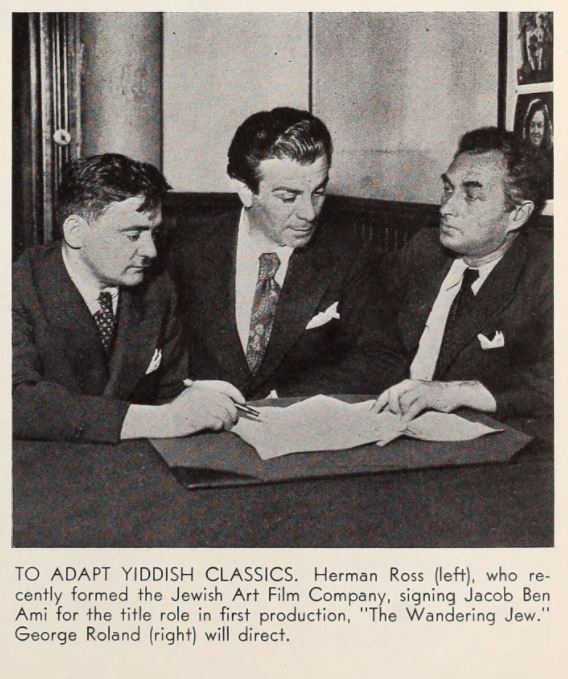George Roland on:
[Wikipedia]
[Google]
[Amazon]
 George Roland (1881-1961) was a
George Roland (1881-1961) was a
IMDB page for George Roland
{{DEFAULTSORT:Roland, George Film directors from New York City Jews from the Russian Empire Yiddish-language film directors 1881 births 1961 deaths Russian emigrants to the United States American people of Russian-Jewish descent
 George Roland (1881-1961) was a
George Roland (1881-1961) was a Yiddish language
Yiddish (, or , ''yidish'' or ''idish'', , ; , ''Yidish-Taytsh'', ) is a West Germanic language historically spoken by Ashkenazi Jews. It originated during the 9th century in Central Europe, providing the nascent Ashkenazi community with a ver ...
film director and editor of the 1930s.
Biography
Early life
George was born in theRussian Empire
The Russian Empire was an empire and the final period of the Russian monarchy from 1721 to 1917, ruling across large parts of Eurasia. It succeeded the Tsardom of Russia following the Treaty of Nystad, which ended the Great Northern War. ...
on June 30, 1881. His exact birthplace, education or early life are poorly documented. Earlier in his life he sometimes went by the name George Kohn Roland or George Rolands.
Film career
According to various government documents, George was already working as a director in the film industry during theFirst World War
World War I (28 July 1914 11 November 1918), often abbreviated as WWI, was one of the deadliest global conflicts in history. Belligerents included much of Europe, the Russian Empire, the United States, and the Ottoman Empire, with fightin ...
. However, there is little documentation of what he was directing until the early 1930s.
Roland used innovative techniques of re-cutting and re-editing existing films for many of his 1930s works. His first film, 1932's ''Joseph in the Land of Egypt'', was created by careful re-editing of a 1914 Italian film '' Joseph in Egypt'', with a new beginning and ending filmed by Roland. He followed the film with another re-cut work, ''Yidishe Tokhter'', which involved new narration and scenes filmed around a 1921 German film, '' Judith Trachtenberg''. And then, in 1933's ''Avrom Ovino'' (Abraham our Patriarch AKA The Wandering Jew), he cut together various short Bible films with new narrations and scenes set in Nazi Germany, and then re-edited a 1924 Polish film ''Tkies Kaf'' by Zygmunt Turkow and released it as ''Dem Rebins Koyekh'' and ''A Vilna Legend''. Despite the derivative nature of these films, The Wandering Jew in particular received positive coverage and praise for the quality of Jacob Ben-Ami
Jacob Ben-Ami (November 23 or December 23, 1890, Minsk, Russian Empire – July 2, 1977, New York City, New York, United States) was a noted Belarusian-born Jewish stage actor who performed equally well in Yiddish and English.
Biography
Ben-Ami ...
's acting.
In 1936, Yiddish film pioneer Joseph Seiden
Joseph Seiden (; 1892–1974) was a pioneering American Yiddish language film producer of the early twentieth century. He released a large number of low-budget, sentimental Yiddish dramas during the 1930s and 1940s. He also directed ''Paradise in ...
hired Roland to join him to create a new round of films. Their first collaboration was ''Libe un Laydnshaft'' (Love and Passion or Love and Sacrifice).
However, it is unclear how long their collaboration lasted or how many more films Roland directed. In the 1940 census he listed his occupation as film editor.
Roland died in 1961.
Since his death, some of his films have been restored and re-released by the National Center for Jewish Film The National Center for Jewish Film is a non-profit motion picture archive, distributor, and resource center. It houses the largest collection of Jewish-themed film and video outside of Israel. Its mission is to collect, restore, preserve, catalogu ...
, including The Wandering Jew in 1999, A Vilna Legend in 1980 and again in 2002, and Love and Sacrifice in 2000.
Filmography
* ''Joseph in the Land of Egypt'' (in English, 1932), with music byIsrael J. Hochman
Israel J. Hochman ( yi, ישראל האָכמאַן, 1872–1940) was a Russian-born Jewish American violinist, klezmer bandleader, music arranger, and recording artist in early Twentieth Century New York City. He recorded prolifically for Edison ...
* ''Yidishe Tokhter'' (Jewish Daughter) (in Yiddish, 1933)
* ''Avrom Ovino'' (also released as ''The Wandering Jew'' and ''The Eternal Jew'') (in Yiddish, 1933), starring Leibele Waldman
* ''Dem Rebins Koyekh'' AKA ''A Vilna Legend'' (in Yiddish, 1933)
* ''Liebe und Liegemshaft'' (Love and Sacrifice) (in Yiddish, 1936), starring Leibele Waldman, with music by Abe Schwartz
* ''Ikh vil zayn a Pansyoner'' (I want to be a Boarder) (short in Yiddish, 1936)
* ''Ikh vil zayn a Mame'' (I want to be a mother) (short in Yiddish, 1936)
* ''The Dybbuk'' (1938, in Yiddish) as editor, directed by Michael WaszynskiReferences
External links
IMDB page for George Roland
{{DEFAULTSORT:Roland, George Film directors from New York City Jews from the Russian Empire Yiddish-language film directors 1881 births 1961 deaths Russian emigrants to the United States American people of Russian-Jewish descent